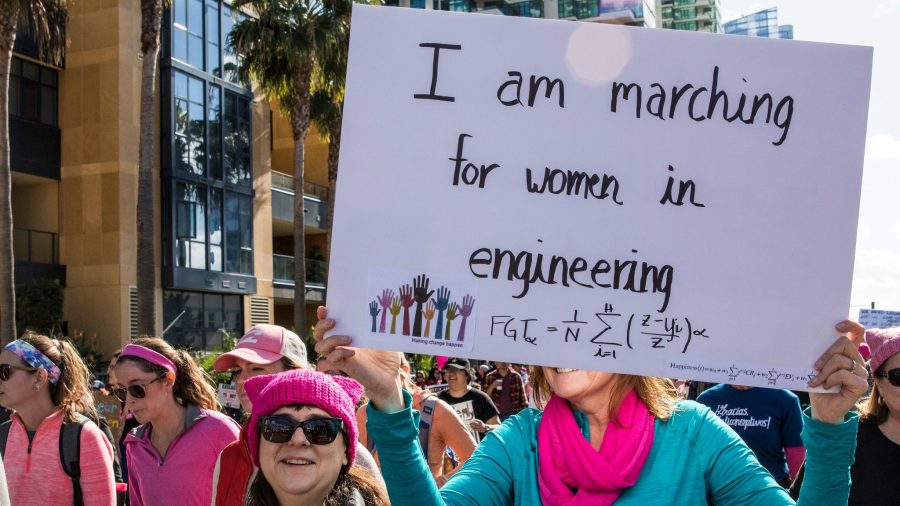In a gathering of nearly 37,000 people, activists marched the streets of San Diego with a mosaic of homemade signs to advocate for women’s rights. This year’s Women’s March was entitled “Hear Our Vote” in support of the midterm elections taking place in November. Hosted by the Women’s March Organization, the event ran between 10 a.m. and 1 p.m. on Saturday, Jan. 20, one year since President Donald Trump’s inauguration.
According to the Women’s March San Diego’s official Facebook page, “Hear Our Vote is designed to engage and empower voters to support women’s rights, human rights, social and environmental justice, and to encourage participation in 2018 midterm elections.”
Speakers and marchers also showed support for action on debated issues. Hoping to spark an increase in voter turnout on these issues, California Assemblywoman Shirley Nash Weber said in a speech, “Are you going to continue to march about it? What are you going to do about it? We represent over 50 percent of the population. Women have the power to change.”
Several other public officials who were present at the event included San Diego Councilmember Georgette Gómez, Senator Toni Atkins, Assemblywoman Lorena Gonzalez, San Diego Councilmember Barbara Bry, and Congresswoman Susan Davis.
Speaker, stylist, and manager of Le Red Balloon, Skyler McCurine acted as the master of ceremonies, and prior to the march itself, performances were provided by musician Veronica May and the San Diego Women’s Chorus.
Members of the Kumeyaay Nation, the original inhabitants of the land in the San Diego and Baja California region, blessed the event goers and the march.
Shortly after, as the marchers walked a 1.29-mile route on North Harbor Drive and looped back to Waterfront Park on Pacific Highway, cover band The Resizters provided a performance.
Beatrice Zamora-Aguilar, lead dancer for the Chicano-Aztec dance group Danza Mexicayotl, believes the march is important for everyone because it “[builds] awareness and consciousness that we have a lot of issues we still have to deal with in this country. We need to get the vote out. We need to fight for fairness, equality, and justice for all.”
The wide variety of subjects highlighted in the event by speakers and marchers included education, health care, women’s health, the environment, and immigration. The full list of causes supported by the Women’s March Organization are listed on their website, as well as the specific organizations designed for those causes, some of which held booths at the San Diego march.
SanDiego350 board member Angela Deegan believes climate disruption is important to the women’s march because “climate affects everybody. It’s a big overarching issue and obviously, Trump is very bad at it. He wants to pull us out of the Paris Agreement, although I heard recently that maybe he won’t. You don’t know what he’s going to do.”
The marchers themselves expressed an array of issues they deemed relevant by decorating rally signs. Some posters seen in the march read, “The future is female,” “America, we are better than this,” “There is no Plan(et) B,” “I stand with Planned Parenthood,” “Impeach the peach,” “Love, not hate, makes America great,” and “A woman’s place is in the resistance.”
A number of UCSD students also attended the march.
Thurgood Marshall College junior Kol Chaiken explained to the UCSD Guardian that she attended to show unity with women of all backgrounds.
“I marched because I wanted to participate in an event organized by hundreds of powerful women of many different races, religions, and backgrounds coming together to speak out about the injustice towards women of color, immigrants, low-wage workers, victims of sex trafficking and so many other profound intersectional issues,” Chaiken said. “The choir was beautiful and the speakers got me pumped up for the midterm elections. It made me excited to be helping register students to vote with the [Student Organized Voter Access Committee] and the [California Public Interest Research Group] in the next two quarters.”
There was an estimate of over 250 “sister marches” nationwide and several were held in cities in other countries such as Italy, Germany, and Canada.
Photo by Francesca Hummler | UCSD Guardian














